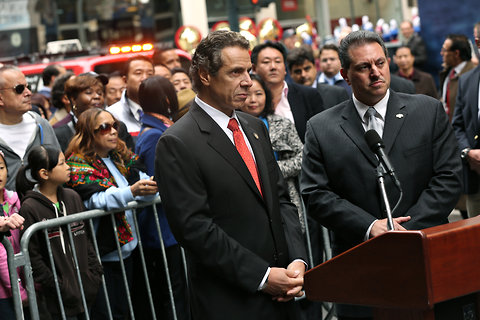By Gerry Smith | Huffington Post
A few months after the Sept. 11 attacks, when crippled phone networks thwarted communications across New York City, Congress called for the creation of what could be called the nerd reserves.
Lawmakers tasked the federal government with establishing a volunteer force of IT experts -- the tech equivalent of a National Guard -- that could respond to disasters by fixing damaged computer or telecom equipment or providing high-tech assistance to relief workers.
But a decade later, the federal government has still not established the National Emergency Technology Guard, known as NET Guard.
Now, in the wake of Hurricane Sandy, proponents are renewing their call for a cyber reserve corps. A highly-organized network of tech volunteers, they say, could have quickly re-established wireless networks in New York and New Jersey, which were down for several days, or built online tools for tracking gasoline, water, medical supplies or even displaced nursing home residents, said Andrew Rasiej, chair of NY Tech Meetup.
"In the same way you need National Guardsmen to protect communities when the river is cresting, we need national tech guardsmen to protect our critical communications infrastructure," Rasiej said.
There was no shortage of tech-savvy volunteers after Sandy. More than 900 people from New York’s startup community signed up to help schools, nonprofits and small businesses get back online, Rasiej said. But their efforts were slowed down by a lack of organization.
“We had all these volunteers, but not everybody knew what they needed or knew they were available,” he said. "We lost precious time in advance of the storm and after the storm because we didn't have a set of protocols."
Despite the challenges, members of the New York's tech community built maps tracking instances of price gouging, helped small businesses with websites and data recovery, and participated in several “hackathons” to build apps, platforms and tools to help with hurricane recovery.
In 2002, Congress approved NET Guard as part of a bill that created the Department of Homeland Security. NET Guard would have organized employees at the nation's tech companies -- software engineers, website designers and wireless communications specialists -- put them through periodic training, and ensured their jobs would be safe while they left to help with disaster recovery.
In 2008, DHS created a pilot program, and later created an online tutorial to show how communities could organize their own tech volunteers. But DHS never fully implemented the program.
A DHS spokesman declined to comment about why NET Guard was never established. But proponents say the program was never adequately funded and suffered from a lack of interest within the Department of Homeland Security, which was tasked with its creation.
Though NET Guard was never fully realized, similar ideas have surfaced elsewhere. Groups like Crisis Commons, Nethope.org, and Geeks Without Bounds organize volunteer tech experts to create online tools that help relief and recovery efforts around the world.
Yet Rasiej said there is still a need for a single organization -- a unified corps of cyber reservists -- to coordinate those efforts for the next crisis.
"It's not that there aren't enough volunteers," he said. "It's that they’re not trained and coordinated to be most efficient. You want to have this already organized. You don't want to re-invent the wheel every time there’s a new disaster."
Read Original Article: Huffington Post.



